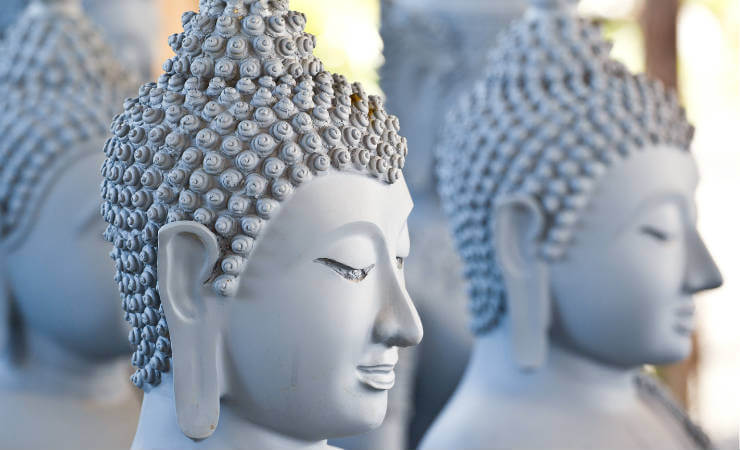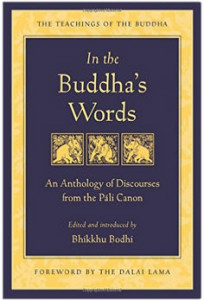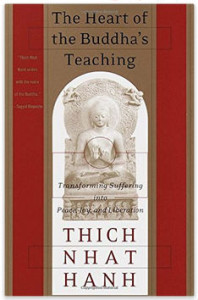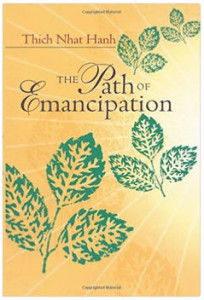
You Are What You Eat…And What You See, What You Hear, What You Say, What You…
We have all heard the expression ‘you are what you eat’. The food that we take into our body becomes a part of us and our body reacts to it. If we eat very poorly for several days, we will feel sluggish and weak. If we eat healthfully, we feel energized and strong.
The Buddha said,
A being subsists on nutriment.
However, we consume or ‘feed’ ourselves with much more than just edible food.
The Buddha said,
There are four kinds of nutriments which enable living beings to grow and maintain life.
What are these four nutriments? The first is edible food, the second is the food of sense impressions, the third is the food of volition, and the fourth is the food of consciousness.
What is a nutriment?
A nutriment is something that nourishes us; it is a source of energy. It promotes growth and helps maintain life. The nutriment that we are most familiar with is the food we eat. However, in additional to biological nutriments, there are also mental life nutriments.
We ‘consume’ many things all day long. And the things that we consume give us the life that we have. If we are unhappy with what we have, we need to look at the nutriments (energy sources) that we have consumed. We often ‘feed’ on things that harm us when we need to put our attention on the things that support our well-being.
To understand what the Buddha means, it helps to look at each of The Four Nutriments of Life.
- Edible Food
- Sensory Impressions
- Volition
- Consciousness
The First Nutriment: Edible Food
Eating healthy foods is obviously what helps us maintain good physical health. It is equally important to stay away from toxic food and food that harms the body.
However, there is more to this nutriment than what it does for the physical body. We must also understand the this nutriment effects our mental life as well.
The Buddha says that when we eat, we need to practice mindfulness. Mindfulness is a key component in Buddhism; it is what leads to Enlightenment.
We need to be mindful of what we are eating, how we are eating, and why we are eating. The Buddha illustrates the importance of this in a rather gruesome simile.
In the Pali cannon, there is a story or discourse called the Puttamansa Sutta which is translated as, The Son’s Flesh.
The story is of a couple and their young son crossing the desert to a new land. They thought they had enough food for the trip, but they run out half way through. The travelers knew they were doomed to die in the desert.
After much debate they decided to kill their son and eat his flesh in order to survive. Every time they ate, they asked, ‘Where is our beloved son now?’ in absolute despair. It is because of this choice however, that they were able to survive.
After telling this horrific story, the Buddha asks the monks,
Do you think the couple ate their son’s flesh because they wanted to enjoy its taste and because they wanted their bodies to have the nutriments that would make them more beautiful?
The monks answer,
No, how could anyone enjoy eating the flesh of their own son?
Then the Buddha asks,
Did the couple only eat their son so they could make it through the desert and survive?
‘Yes’, the monks answer.
The couple was undoubtedly mindful of their consumption and would certainly never eat more that what they needed to survive and made sure they wasted nothing.
The Buddha responds,
If we do not consume mindfully we are eating the flesh of our own son or daughter.
While this is a disturbing story, the message needs to be understood. We do not have unlimited resources. If we are mindful and present when eating, we will develop compassion and perspective.
If we are not mindful, we over-produce, over-consume and the result is the depletion of resources and the destroying of life for generations to come.
Many children die each day because they are starving. Every time we eat without mindfulness, we are metaphorically eating those children. Animals are abused and slaughtered because of our appetites. When we are mindful we can have awareness of what is actually going on and how the world and other people are suffering.
Many times we over-consume or throw food away or eat without thinking of others. This is the equivalent of eating the flesh of our son.
eating the flesh of our son.
In The Heart of the Buddha’s Teaching, Thich Nhat Hanh says,
We have to look deeply to see how we grow our food, so we can eat in ways that preserve our collective well-being, minimize our suffering and the suffering of other species, and allow the earth to continue to be a source of life for all of us. If, while we eat, we destroy living beings or the environment, we are eating the flesh of our own sons and daughters. We need to look deeply together and discuss how to eat, what to eat, and what to resist.
The Second Nutriment: Sensory Impressions
We ‘consume’ things with our eyes, our ears, tongue, nose, body, and mind.
When you watch a movie, you are ‘feeding’ your senses. Talking with a friend or listening to the news is ‘food’.
Many of the things that we encounter everyday are very toxic. We encounter unspeakable violence, evil, greed, hate, and dispair. We are, in essence, being poisoned and we don’t even realize it.
In our world of constant connectivity, this is something to really think about.
The radio, books, music, the internet, magazines, and so on – we are bringing these things into our consciousness and it effects our well being. Through our senses, we are essentially planting seeds that grow in our mind.
The cure? Mindfulness. We must be mindful of what we consume in this realm. We should act like guards at the door of our sense impressions – only letting in what will be helpful.
Our fear, anger, and hatred are fed and nourished by the toxic things that we consume. We must stop consuming fear, anger, and hatred.
This is not meant to suggest that we shut the world out, but there is no reason to subject ourselves to the constant stream of dread.
Mindfulness should be the guard for our senses.
The Third Nutriment: Volition
This nutriment pertains to what it is that we want in life. Our volition is what motivates us to act, it is what we desire.
It is important to know what our volition is or what it is that drives us. The thing that motivates us or the thing that we desire can either bring us happiness or suffering.
Unhealthy motives and desires will lead to suffering, while healthy motives and desires will lead to happiness.
For example, the Buddha’s volition or desire was to help everyone be free from suffering.
Volition is our source of energy and determines the quality of our life. If your volition is to do good, then you will be rewarded. But if your volition brings suffering and pain, then you will lead a life of suffering. This is not a good energy.
We must look deeply within to see what our true volition or desire is. Are we desiring what is good for all beings or do we have selfish desires? While making our way through the world, do some of the things we do harm or hurt others?
That which we desire – our volition – will either bring us happiness or misery.
The Fourth Nutriment: Consciousness
Consciousness represents the sum of all of the things we have done. We can be very influenced by our past experiences. We carry with us past sufferings, many of which are below our conscious level. In this sense, we continue to bring suffering to ourselves.
Thich Nhat Hanh says in The Path to Emancipation,
The Buddha used the following image to illustrate the fourth kind of nutriment. A criminal was arrested. The king gave the order to stab him with one hundred knives. The criminal did not die. The same punishment was repeated at noon and in the evening. Still he did not die. The punishment was repeated the next day, and the day that followed.
 We feed on things that harm us; it is like stabbing ourselves over and over.
We feed on things that harm us; it is like stabbing ourselves over and over.
Thich Nhat Hanh continues,
We allow our consciousness to be fed every day with the poison of ignorance, craving, unwholesome speech, and unwholesome desires. Our consciousness continues to grow in the direction of the deluded mind, and brings forth much suffering. We should change our consciousness food and help it grow in the opposite direction, the direction of the true mind.
It is not uncommon for us to be upset for hours about an incident that lasted only a few seconds. A simple example is getting cut off in traffic and carrying around anger toward some unknown person (for an unknown reason) for many hours. We may even tell people about it and make the anger fresh again.
When we become mindful of what it is that we are doing, we can recognize the harm and suffering that we are bringing to ourselves.
The Buddha said,
If you look into ill-being and identify the source of the nutriments that has brought it into you, you are already on the path of emancipation.
There is no denying that we need nutriments that allow us to grow and develop. Nutriments give us energy and allow us to prosper. However, being mindful of the nutriments that are available to us is imperative. There are many unhealthy and harmful ‘foods’ to consume and the damage they can do is only apparent when we are mindful.
Thank you for this article on how we feed our attention is very important in spiritual path and cultivating noble citizenship and leadership of virtue.
Beautiful article. Easy to understand and extremely helpful. Thank you. May all beings be free of suffering and full f joy.
Thanks Rena – I’m so glad you liked it!
Very informative article. I hope this kind of knowledge and information will be available in abundance in the coming future.
Thanks, Dhiraj!
Very well written article with relevant examples. Thank you!
Thank you, Rajiv!
Your article is well written and every body can understand well of such deep cpncepts
Thank you
Hrmantha
Thank you, Hemantha
arrived at this page after seeing a short Thich Naat Hanh YouTube on the same subject. This has helped to clarify it, thank you
Thank you, Daniel! I’m so glad it helped.
I truly appreciate, first time I come across a book based on Budha’s teachings, and I am delighted, very grateful. Many thanks!
Thank you!
This is the best explanation of the four nutriments that I have found. Thank you!
Thank you Daniel!